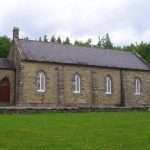Sermon for Sunday, 2nd October 2016 (Nineteenth Sunday after Trinity/Ordinary 27)
“We are worthless slaves; we have done only what we ought to have done!” Luke 17:10
A tree, a table and an apron: three objects mentioned in the Gospel reading can help us think about our being Christian, three objects that can help us think about faith, about humility, and about service.
Jesus has warned the apostles in the previous verses that it would be better to have a millstone around their neck and for them to be thrown into the sea than for them to cause harm to the faith of those who were little ones. It is stern stuff that explains why the apostles say in Saint Luke Chapter 17 Verse 5, “Increase our faith!” They realize how inadequate their faith is to the task that lies ahead of them. They cannot have been encouraged by Jesus answer to them in Verse 6, “If you had faith the size of a mustard seed, you could say to this mulberry tree, ‘Be uprooted and planted in the sea’, and it would obey you.” The disciples must have looked at the mulberry tree and wondered what faith would mean if such a feat was possible. How would they possibly have the sort of faith of which Jesus spoke?
The mulberry tree is a reminder of the weakness of our faith, Jesus knows that the disciples would all desert him when the hour of danger came, but would learn from their failings and become strong in their faith. The mulberry tree is a reminder that our faith by itself is not enough, that we depend on God. Saint Paul writes in the Letter to the Ephesians Chapter 2 Verse 8, “For by grace you have been saved through faith, and this is not your own doing; it is the gift of God.” If we had faith the size of a mustard seed, we might be able to uproot a tree and plant it in the sea, but we are not being asked to do so. All we are being asked to do is to accept God’s grace, accept what he has done for us, accept his gift. The mulberry tree is a reminder to us that we do not depend on our own efforts.
The tree teaches us about faith. The table teaches us about humility.
Slaves were property, they were commodities that could be bought and sold, they were human beings whose value was calculated in pieces of silver. Exodus Chapter 21 Verse 32 places a price upon the life of a slave, if a slave was killed by an ox, then the owner must be recompensed with thirty pieces of silver. Slaves were people without social standing, without respect. Jesus asks the disciples a question to which they all knew the answer. In Verse 7, he says, “Who among you would say to your slave who has just come in from ploughing or tending sheep in the field, ‘Come here at once and take your place at the table’?” Slaves were not people to be treated with equality, they were not people to be welcomed to the table.
Humility is difficult for us, it is not a popular idea. Humility runs against the way of thinking that tells us that we are entitled to have what we want, that we are entitled to be respected, that we are entitled to be happy. Writing to the church at Philippi, Saint Paul has to remind the Christians there that they are expected to live lives of humility. In Philippians Chapter 2 Verse 3, he writes, “in humility regard others as better than yourselves.” We are to show such humility not because it is our preference, but because it is the way of Jesus, who says Saint Paul, in Verses 6-7 of that chapter, “though he was in the form of God, did not regard equality with God as something to be exploited, but emptied himself, taking the form of a slave.” The table is a reminder to us about our place, if Jesus becomes as a slave for our sake, then we should realize we are called to be humble.
The tree teaches us about faith that depends on grace, the table teaches us about the need for humility, and the apron teaches us about service.
Jesus asks the disciples, in Verse 8, whether or not the master would say to the slave, “Prepare supper for me, put on your apron and serve me while I eat and drink; later you may eat and drink.” In Verse 9, he warns them them service may be a thankless task, “Do you thank the slave for doing what was commanded?” What thoughts must have passed through the disciples’ minds at the thought that they should be like slaves wearing an apron? In Saint Mark Chapter 10 Verse 45, Jesus makes it clear that this is what his own ministry is about, “For the Son of Man came not to be served but to serve, and to give his life a ransom for many.” There must have been doubts, questions, reservations among those who were listening. The idea of being treated like someone who would wear an apron like a slave would have been a very uncomfortable thought for free men accustomed to doing and going as they pleased; some may have wondered whether they would continue to follow Jesus.
The apron symbolises the sort of service that is difficult for us, service that receives no thanks, service that goes unrecognized. It is the sort of service that Jesus expects. He tells his disciples, in Verse 10, “So you also, when you have done all that you were ordered to do, say, ‘We are worthless slaves; we have done only what we ought to have done!'” How many of us are prepared to serve God in such a way?
Jesus’ way runs counter to the ways of our world, it runs counter to a world where personalities matter, where material goods matter, where social standing matters. The tree, the table and the apron remind us that Jesus’ way is not an easy way.
A prayer of Saint Ignatius Loyola, the founder of the Jesuits captures a sense of the faith, the humility and the service for which Jesus looks in each of us.
Teach us, good Lord, to serve thee as thou deservest;
To give, and not to count the cost,
to fight, and not to heed the wounds,
to toil, and not to seek for rest,
to labor, and not to ask for any reward,
save that of knowing that we do thy will.



Comments
Sermon for Sunday, 2nd October 2016 (Nineteenth Sunday after Trinity/Ordinary 27) — No Comments
HTML tags allowed in your comment: <a href="" title=""> <abbr title=""> <acronym title=""> <b> <blockquote cite=""> <cite> <code> <del datetime=""> <em> <i> <q cite=""> <s> <strike> <strong>